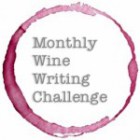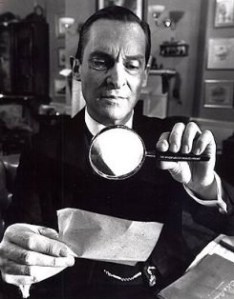Every month there is a Wine writing challenge among bloggers, it was launched by The Armchair Sommelier and the last winner was The Drunken Cyclist. The last winner picks the theme and so, for this 6th edition of the Monthly Wine Writing Challenge, the theme is… Mystery (cue the spooky sound effect). Here is my entry for the MWWC6, I hope you enjoy reading it as much as I enjoyed writing it !
The year was 1947, the city, Los Angeles. Across the glass panel of a PI’s office door, the silhouette of a woman appears. The scene is black and white, volutes of smoke rise from what is supposedly the PI’s cigarette. Soon, the woman will open the door and you already know she’ll be a seductive, mysterious and dangerous vixen. Why do you know? Because that’s what the codes of mystery novels and film noir have ingrained in your brain. You expect certain things, certain trappings to come with a Dashiell Hammett novel. You pay for the story; you get the clichés for free. They could be a fedora sporting PI, a trench coat clad stalker or a dame with a cigarette holder, or another hundred things. Film noir is a genre with a lot of expected codes, at least it is for me, and, in a couple of ways I can associate that with wine.
There is one obvious mystery angle to wine, the whole blind tasting thing. It looks event cooler when you use those black glasses (trappings and codes again) but you do not have to. Actually I’m not a fan of the tinted glasses. I enjoy looking at a wine and racking my brain for the adequate shade descriptor. , Also, I have to confess, at my level, I need all the visual stimuli I can get in order not to be completely off in my guesses. And I still usually end up missing by a mile anyway…
But anyway, I digress, blind tastings are the most basic and the most elaborate mystery stories wrapped into one. Why basic? It’s a simple whodunit, a game of Clue where you’re looking for a grape variety instead of a murderer and a region instead of a murder weapon. Simple, yes, but efficient. What is more exhilarating than catching the bad guy? More satisfying than knowing you were right? You earn the right to “Elementary my dear Watson” the people around you in a British accent (I can’t do a British accent to save my life but I’m trying to make a point, please bear with me).
Why complex then? Well, because it’s hard! I’m not a great wine PI, in Hammett’s world I would be stuck with insurance fraud or cheating husbands cases, not asked to recover stolen rare statuettes. Wine is tricky, it lays false trails. Winemakers emulate techniques and styles, oak barrels lurk around dark corners and deserted alleys. Can you trust your informants? Is the acidity lying to you? Are the tannins what they say they are? You thought you saw a glimpse of blackcurrant from the corner of your eye but as you turn around, it’s gone. The trail is cold now, better go back to the office and have another sip, start fresh. Solving a wine mystery is frustrating work. But this is what I do. I promised that lady in the red dress I’d find her wine, why did I do that, why did I take this case? This city… I need a drink.
Em… Sorry about that. I got caught up in my stereotypical film noir fantasy. As I said, there are cultural trappings, expectations that come with any defined genre like mystery novels. The question is, at which point do your expectations start to influence or even define your experience? Is it easy, or even possible to enjoy something when you have already anticipated what it would be like? What if it doesn’t conform to the picture in your mind? What if it goes in a completely different direction? You open a bottle of Californian Chardonnay and you expect oak, what happens if that one producer decided to go for a clean, unaltered style? Are you automatically disappointed or do you just take it in stride? Having expectations means that you can easily be surprised or disappointed. Ideally you’d like to approach a glass of wine innocently, like a cheated on husband or an unsuspected patsy, without a clue.
But we are not like that, we are wine detectives, we like solving mysteries. And, like a down on his luck PI who cannot resist the vampish adulterer in the red dress, we cannot resist falling into the expectations trap. We’re wine enthusiasts, we love learning about wine, writing about it, talking about it. The whole point is to learn something; the effect oak has on a wine, the flinty quality of Chablis wines or the tobacco aromas of Cabernet. That knowledge helps us but it also makes us vulnerable. It’s a double edged sword; it can help us or prevent us from solving a wine mystery. It all depends if the wine in question is playing by the book or not. As a rule, film noir villains do not. Wines mostly do though, and the ones that do not are usually known for the mavericks they are. Deliberately or not, by personal taste, because of freak weather or by pure mischievousness, wine makers will sometimes stump us and evade us, like Arsène Lupin taunting dim-witted policemen after yet another daring escape.
And you know what? It doesn’t really matter if you solve the mystery or not. Nobody will shoot you; you don’t have to betray a friend to the police. You can just have another glass, there will always be another Maltese Falcon to chase, the pleasure lies in the mystery, not in the reveal, even though the reveal can be downright satisfying. Sometimes, wine is just that, the thrill of the chase. Now if you’ll excuse me, I think Doctor Watson just opened a new bottle and I am sure he will need my help to crack the case.




Antoine, excellent play in the theme! I’m very happy watching film noir of yours. Hell, sometimes, I even play a role!
Thanks ! When I saw the theme my mind immediately raced to those old Humphrey Bogart movies.
Reblogged this on mwwcblog.
Pingback: Monthly Wine Writing Challenge #6 (#MWWC6)—Mystery | the drunken cyclist
This is a fabulous entry and has certainly set the bar high this month… I love the thought of blind wine tasting being a “whodunit”… Brilliant!
Thanks, I was inspired by the Mystery theme I think !
A very fun piece!
Thanks, glad you liked it !
Pingback: Monthly Wine Writing Challenge #6—Update | the drunken cyclist
Great fun read. I’d not want to follow up!
I appreciate the compliment ! Some of the other entries are very good too, it’s a great theme 🙂
The joy of blind tasting….wonderful post.
Thanks ! I appreciate it.
Pingback: Monthly Wine Writing Challenge #6 (Mystery)–Time to Vote! | the drunken cyclist
Great post!
Thanks !
Good work!!
Pingback: Monthly Wine Writing Challenge #6 (Mystery)–Time to Vote! | the drunken cyclist
Agree – who cares who solves the mystery ….it’s the getting there that’s all the pleasure.